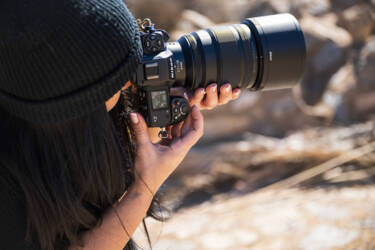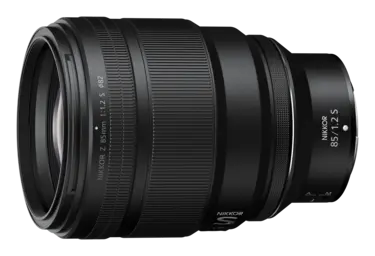The magic of primes

Unlock the creative power of prime lenses and take your images to the next level with this guide
First, let’s put it out there: zoom lenses are super-useful tools. They offer a lot of flexibility and creative freedom on a shoot, so no wonder a mid-focal range zoom such as the NIKKOR Z 28-75mm f/2.8, the NIKKOR Z 24-70mm f/2.8 S or NIKKOR Z 24-70mm f/4 S, almost always finds its way into most Nikon camera bags.
Fixed focal length prime lenses, however, offer something completely different and, for many stills and video shooters they are essential to getting their images just right. From ultra-wide landscapes to street scenes and portraits, from product photography to wildlife and sports, whatever you shoot there’s a prime lens to fall in love with. Using prime lenses is also a great way to up your photography and filmmaking skills: primes make you move instead of standing still, helping you find your composition style. Read on to see which prime lenses should be making their way into your gear collection, and why.

Stay sharp
Unlike zoom lenses, which cover a wide range of focal lengths, primes have just one job to do, and they’re built to do it. As a result, prime lenses are often slightly sharper across the entire image than a zoom lens. Landscape and wildlife photographers, for example, who want to print their work out in very large sizes, love a prime for this reason (Lara Jackson tells us why here). The NIKKOR Z 20mm f/1.8 is great for landscape work, with its ultrawide angle of view and edge-to-edge razor-sharpness. The f/1.8 aperture is fantastic for low light situations outdoors, for going in close, and getting great bokeh when you need it.

Lose some weight
Many primes are lighter than zooms which means they are perfect for shooting and filming on the fly. With a weight of 125 g, the NIKKOR Z DX 24mm f/1.7 prime (equivalent to 36 mm in a full-frame camera), is the ultimate travel companion. Many street photographers, for example, shoot with a NIKKOR Z 35mm f/1.8 S or NIKKOR Z 40mm f/2 as it allows for natural framing, and only weighs 370 g and 170 g respectively.
When the lights go down
Primes are also where we can go low in aperture (all the way down to an impressive f/0.95 with the NIKKOR Z 58mm f/0.95 S), making shooting in low-light situations much easier than with a smaller aperture lens, without having to compensate with a higher ISO or a slower shutter speed. A low aperture primes, such as the NIKKOR Z DX 24mm f/1.7, NIKKOR Z 40mm f/2 or NIKKOR Z 35mm f/1.8 S, provides the perfect set-up for recording indoor and night-time events.
Bring the bokeh
Those larger apertures mean a shallow depth of field and lots more of that creamy bokeh in the background (or foreground). The incredibly narrow focal plane of something like a NIKKOR Z 50mm f/1.2 S can take some getting used to, but the creativity it can unleash is worth all the effort. AF obviously helps, but a low aperture lens such as this is great for practising manual focus and getting to grips with the possibilities it gives you.


It's a people thing
Portrait, wedding, and reportage photographers love primes. An 85 mm such as the NIKKOR Z 85mm f/1.8 S is perfect for weddings because you can get the shots you need without having to go too close to the subjects on their big day – and for portraits you’re not as ‘in your face’ with a nervous sitter. Plus, when shooting video, primes let you set a style and make you think about framing.
Keep it real
Shooting product images for a website? That fixed focal length will make sure your shots are consistent in look and feel. A 50 mm prime such as the NIKKOR Z 50mm f/1.8 S (or even the NIKKOR Z 50mm f/1.2 S) will give you a great ‘natural’ view of a product – any less than 35 mm and some perspective distortion will creep in. When starting out, people are often tempted to zoom out to fit products into a scene. Instead, use a prime and simply move the camera further away.
Stay special
Need a specialist lens for a very particular style of shooting? That’ll be a prime. For example, the NIKKOR Z MC 105mm f/2.8 S is specifically designed for close-up shooting, with a life-size 1:1 reproduction ratio and remarkable bokeh. From stunning portraits and mouthwatering food shots, to insects and flowers in astonishing detail, a macro prime such as this offers up so many creative opportunities.
Check out the latest offers on lenses across the NIKKOR Z range here.
Get creative
Uncover NIKKOR lenses
Welche Objektive verwenden Profis an der neuen Nikon Z 8?
Wie viele Objektive brauche ich?

For limitless creativity










